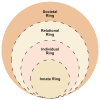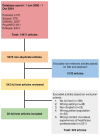Experiences of healthcare professionals providing palliative care in home settings - a scoping review
- PMID: 40155860
- PMCID: PMC11951797
- DOI: 10.1186/s12904-025-01728-z
Experiences of healthcare professionals providing palliative care in home settings - a scoping review
Abstract
Background: The growing preference for home-based end-of-life care accords a dignified death for terminally ill patients. However, for healthcare professionals (HCPs) involved, this caregiving approach is embedded with unique psychosocial, practical and emotional stressors. Without sufficient support, HCPs face higher risks of moral distress, compassion fatigue, vicarious trauma, secondary traumatic stress and burnout-collectively known as the costs of caring-that precipitate depersonalisation and compromised patient care. Despite its far-reaching implications, current understanding of the costs of caring amongst HCPs in home-based settings remains remiss. Thus, we conduct a scoping review to investigate the experiences of HPCs providing home-based palliative care to terminally ill adult oncology patients.
Methods: Outlined by the Systematic Evidence-Based Approach and PRISMA guidelines, searches for relevant articles published between 1st January 2000 and 1st October 2024 were performed on PubMed, Embase, Scopus, PsycINFO and CINAHL databases. Selected articles underwent concurrent and independent thematic and content analyses. Central themes and categories were extracted and merged, forming key domains that framed the discussion.
Results: Of 5676 titles and abstracts screened, 543 full-text articles were reviewed. 20 full-text articles were analysed for inclusion. Four key domains emerged: (1) motivations to practice palliative care; (2) impact on personhood of HCPs (3) challenges faced by HCPs; and (4) support systems for HCPs.
Conclusion: Providing home-based palliative care to adult oncology patients is fulfilling for HCPs-fostering meaningful professional relationships with patients, a more holistic perspective of life and death and a heightened sense of personal accomplishment. However, HCPs may encounter dissonance amidst conflicts between their dominant beliefs and new experiences, leading to burnout, depersonalisation and poor care delivery that are further exacerbated by the costs of caring, if inadequately addressed. Longitudinal and accessible personalised and organisational support is key to sustaining HCPs' capacity to deliver compassionate and high-quality palliative care. The use of the Ring Theory of Personhood framework in this review provides an avenue for the structuring of such support systems.
Keywords: Compassion fatigue; Costs of caring; Healthcare professionals; Homecare; Palliative care; Personhood.
© 2025. The Author(s).
Conflict of interest statement
Declarations. Ethical approval and consent to participate: Not applicable Consent for publication: Not applicable Competing interests: The authors declare no competing interests. Clinical trial number: Not applicable
Figures
References
-
- Ho BJ, Akhileswaran R, Pang GSY, Koh GCH. An 11-year study of home hospice service trends in Singapore from 2000 to 2010. J Palliat Med. 2017;20(5):461–72. - PubMed
-
- Lo TJ, Neo PS, Peh TY, Akhileswaran R, Chen WT, Lee A, et al. Improving quality of palliative care through implementation of national guidelines for palliative care. J Palliat Med. 2019;22(11):1439–44. - PubMed
-
- Sijabat M, Dahlia D, Waluyo A. Experiences of palliative care nurses in providing home-based care for patient with advanced cancer. Enferm Clin. 2019;29(S2):413–7.
-
- Lim YX, Quah ELY, Chua KZY, Lin Ronggui CK, Govindasamy R, Ong SM, et al. A systematic scoping review on dignity assessment tools. J Pain Symptom Manage. 2024;67(4):e263–84. - PubMed
Publication types
MeSH terms
Grants and funding
LinkOut - more resources
Full Text Sources
Medical




